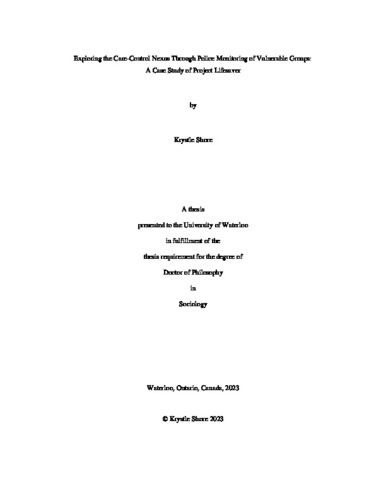| dc.description.abstract | Contemporary surveillance practices increasingly pursue the dual objectives of ‘care’ and ‘control.’ For instance, governments increasingly deploy surveillance to protect the health and welfare of those being monitored, though such practices tend to be coercive and prioritize implicit agendas. Thus, it is important to scrutinize emerging forms of ‘protective’ surveillance. This dissertation conducts a qualitative case study of ‘Project Lifesaver,’ a police surveillance program that involves equipping people with cognitive differences who wander (e.g., people who have dementia) with electronic monitoring bracelets so that first responders can track them if they become lost. This work explores how Project Lifesaver is designed, rationalized, and used, and the implications of this surveillance for individuals and society. Using an abductive approach, this study mobilizes Foucauldian theory to illustrate how surveillance logics are (re)shaping social practices. To achieve these aims, this study encompasses content and thematic analyses of a variety of data sources including Project Lifesaver marketing material, observations from international Project Lifesaver events, interviews with caregivers and first responders, and police documents obtained through Freedom of Information requests. Project Lifesaver is rationalized through constructions of ‘risk’ as a necessary protective measure for people who wander and, even more so, as a source of ‘peace of mind’ for their caregivers. Yet, in practice, the program operates primarily as a form of social control, undermining the autonomy and personhood of people with cognitive differences and placing the responsibility of managing their behaviour squarely on their caregivers. Notably, the program seems inherently aligned with police perspectives, treating both wandering behaviour and caregiver program compliance as matters of public security. Moreover, Project Lifesaver appears tailored to suit a distinct policing agenda that is largely unrelated to the protection of vulnerable populations, serving instead as a tool for reducing police operational costs and improving their public legitimacy. These findings prompt reflection on the tensions inherent to how protective state surveillance is framed and how it operates, and the interests prioritized when support for vulnerable groups is entrusted to the police. The state’s expanded use of electronic monitoring, from a punitive security mechanism to a form of population protection, transcends mere repurposing of carceral technology; it signifies the infiltration of carceral logic into the state’s provision of support for those in need. In the context of Project Lifesaver, this manifests in a coercive care practice that objectifies people with cognitive differences and deputizes their caregivers as agents of social control. Simultaneously, it extends the reach of an increasingly militarized and self-serving police apparatus into public health and welfare domains. These outcomes, however, are obscured by the ‘caring’ elements of the surveillance, which position it as in the best interests of all who engage with it. Thus, this study provides an empirical example of how, through protective police surveillance, population care and control not only coexist but collapse into one another. | en |

